Related Research Articles

Marcus Antonius, commonly known in English as Mark Antony, was a Roman politician and general who played a critical role in the transformation of the Roman Republic from a constitutional republic into the autocratic Roman Empire.
Year 43 BC was either a common year starting on Sunday, Monday or Tuesday or a leap year starting on Sunday or Monday of the Julian calendar and a common year starting on Monday of the Proleptic Julian calendar. At the time, it was known as the Year of the Consulship of Pansa and Hirtius. The denomination 43 BC for this year has been used since the early medieval period, when the Anno Domini calendar era became the prevalent method in Europe for naming years.

This article concerns the period 49 BC – 40 BC.
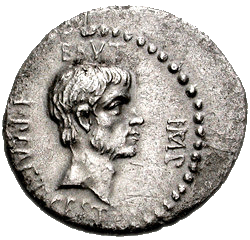
Marcus Junius Brutus was a Roman politician, orator, and the most famous of the assassins of Julius Caesar. After being adopted by a relative, he used the name Quintus Servilius Caepio Brutus, which was retained as his legal name. He is often referred to simply as Brutus.

Year 42 BC was either a common year starting on Monday, Tuesday or Wednesday or a leap year starting on Tuesday of the Julian calendar and a common year starting on Tuesday of the Proleptic Julian calendar. At the time, it was known as the Year of the Consulship of Lepidus and Plancus. The denomination 42 BC for this year has been used since the early medieval period, when the Anno Domini calendar era became the prevalent method in Europe for naming years.
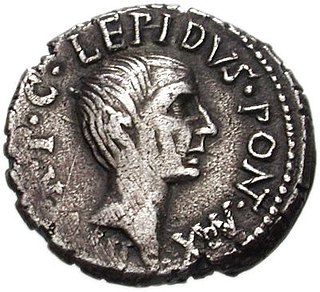
Marcus Aemilius Lepidus was a Roman general and statesman who formed the Second Triumvirate alongside Octavian and Mark Antony during the final years of the Roman Republic. Lepidus had previously been a close ally of Julius Caesar. He was also the last pontifex maximus before the Roman Empire, and (presumably) the last interrex and magister equitum to hold military command.
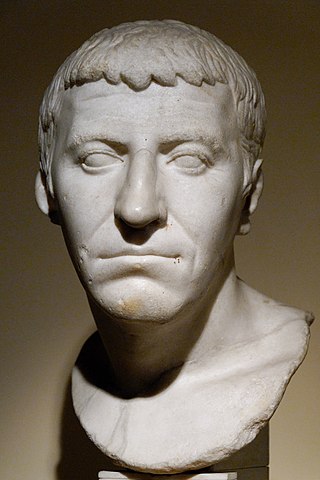
Gaius Cassius Longinus was a Roman senator and general best known as a leading instigator of the plot to assassinate Julius Caesar on 15 March 44 BC. He was the brother-in-law of Brutus, another leader of the conspiracy. He commanded troops with Brutus during the Battle of Philippi against the combined forces of Mark Antony and Octavian, Caesar's former supporters, and committed suicide after being defeated by Mark Antony.
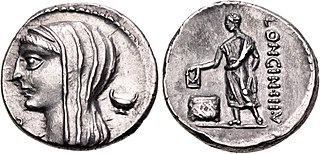
The gens Cassia was a Roman family of great antiquity. The earliest members of this gens appearing in history may have been patrician, but all those appearing in later times were plebeians. The first of the Cassii to obtain the consulship was Spurius Cassius Vecellinus, in 502 BC. He proposed the first agrarian law, for which he was charged with aspiring to make himself king, and put to death by the patrician nobility. The Cassii were amongst the most prominent families of the later Republic, and they frequently held high office, lasting well into imperial times. Among their namesakes are the Via Cassia, the road to Arretium, and the village of Cassianum Hirpinum, originally an estate belonging to one of this family in the country of the Hirpini.

The Battle of Carrhae was fought in 53 BC between the Roman Republic and the Parthian Empire near the ancient town of Carrhae. An invading force of seven legions of Roman heavy infantry under Marcus Licinius Crassus was lured into the desert and decisively defeated by a mixed cavalry army of heavy cataphracts and light horse archers led by the Parthian general Sorena. On such flat terrain, the Legion proved to have no viable tactics against the highly-mobile Parthian horsemen, and the slow and vulnerable Roman formations were surrounded, exhausted by constant attacks, and eventually crushed. Crassus was killed along with the majority of his army. It is commonly seen as one of the earliest and most important battles between the Roman and Parthian Empires and one of the most crushing defeats in Roman history. According to the poet Ovid in Book 6 of his poem Fasti, the battle occurred on the 9th day of June.
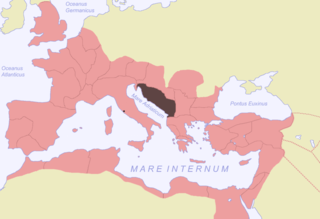
Illyricum was a Roman province that existed from 27 BC to sometime during the reign of Vespasian. The province comprised Illyria/Dalmatia in the south and Pannonia in the north. Illyria included the area along the east coast of the Adriatic Sea and its inland mountains, eventually being named Dalmatia. Pannonia included the northern plains that now are a part of Serbia, Croatia and Hungary. The area roughly corresponded to part or all of the territories of today's Albania, Kosovo, Montenegro, Serbia, Bosnia and Herzegovina, Croatia, and Slovenia.

The Battle of Pydna was a battle fought in 148 BC between Rome and the forces of the Macedonian leader Andriscus. The Roman force was led by Quintus Caecilius Metellus, and was victorious. The battle played an important role in deciding the outcome of the Fourth Macedonian War, and saw the annihilation of the last military-political force of Macedon.

The gens Marcia, occasionally written Martia, was one of the oldest and noblest houses at ancient Rome. They claimed descent from the second and fourth Roman Kings, and the first of the Marcii appearing in the history of the Republic would seem to have been patrician; but all of the families of the Marcii known in the later Republic were plebeian. The first to obtain the consulship was Gaius Marcius Rutilus in 357 BC, only a few years after the passage of the lex Licinia Sextia opened this office to the plebeians.
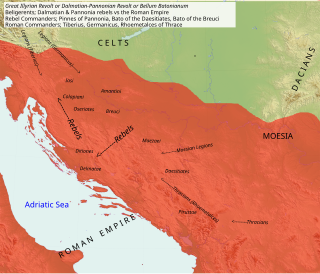
The Bellum Batonianum was a military conflict fought in the Roman province of Illyricum in the 1st century AD, in which an alliance of native peoples of the two regions of Illyricum, Dalmatia and Pannonia, revolted against the Romans. The rebellion began among native peoples who had been recruited as auxiliary troops for the Roman army. They were led by Bato the Daesitiate, a chieftain of the Daesitiatae in the central part of present-day Bosnia and Herzegovina, and were later joined by the Breuci, a tribe in Pannonia led by Bato the Breucian. Many other tribes in Illyria also joined the revolt.

The Liberators' civil war was started by the Second Triumvirate to avenge Julius Caesar's assassination. The war was fought by the forces of Mark Antony and Octavian against the forces of Caesar's assassins, led by Marcus Junius Brutus and Gaius Cassius Longinus, referred to as the Liberatores. The latter were defeated by the Triumvirs at the Battle of Philippi in October 42 BC, and committed suicide. Brutus committed suicide after the second part of the battle.
Cilician pirates dominated the Mediterranean Sea from the 2nd century BC until their suppression by Pompey in 67–66 BC. Because there were notorious pirate strongholds in Cilicia, on the southern coast of Asia Minor, the term "Cilician" was long used to generically refer to any pirates in the Mediterranean.

Julius Caesar was assassinated by a group of senators on the Ides of March of 44 BC during a meeting of the Senate at the Curia of Pompey of the Theatre of Pompey in Rome where the senators stabbed Caesar 23 times. They claimed to be acting over fears that Caesar's unprecedented concentration of power during his dictatorship was undermining the Roman Republic. At least 60 to 70 senators were party to the conspiracy, led by Marcus Junius Brutus, Gaius Cassius Longinus, and Decimus Junius Brutus Albinus. Despite the death of Caesar, the conspirators were unable to restore the institutions of the Republic. The ramifications of the assassination led to his Martyrdom, the Liberators' civil war and ultimately to the Principate period of the Roman Empire.
Tiberius Canutius or Cannutius was tribune of the plebs in 44 BC, the year of Caesar's assassination. As a supporter of the senatorial party, he opposed the triumvirs, resorting to military force during the Perusine War. He was captured and put to death by Octavianus in 40 BC.
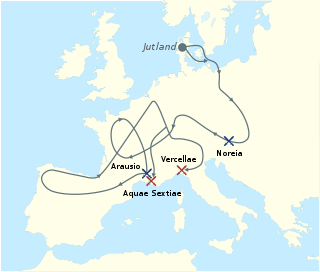
The Battle of Burdigala was a battle of the Cimbrian War that occurred in the year 107 BC. The battle was fought between a combined Germanic-Celtic army including the Helvetian Tigurini under the command of Divico, and the forces of the Roman Republic under the command of Lucius Cassius Longinus, Lucius Caesoninus, and Gaius Popillius Laenas. Longinus and Caesoninus were killed in the action and the battle resulted in a victory for the combined tribes.
The Siege of Apamea was a failed attempt by the Caesarians near the end of Caesar's Civil War to capture the rebel city of Apamea, Syria Secunda. Lucius Statius Murcus and Quintus Marcius Crispus led the attempt to capture the city, while Equite Quintus Caecilius Bassus led the defence of the city.
The War of Mutina was a civil war between the Roman Senate and Mark Antony in Northern Italy. It was the first civil war after the assassination of Julius Caesar. The main issue of the war were attempts by the Senate to resist Antony's forceful assumption of the strategically important provinces of Transalpine and Cisalpine Gaul from their governors. The Senate, led by Cicero and the consuls attempted to woo Julius Caesar's heir to fight against Antony. Octavian, however, would pursue his own agenda.
References
- ↑ Broughton, 1. p. 406
- ↑ Goldsworthy, Adrian (2004). In the Name of Rome: The Men Who Won the Roman Empire. Sterling Publishing Company, Inc. p. 89.
- ↑ Ó hÓgáin, Dáithí (2002). The Celts: A History. Boydell Press. p. 115.
- ↑ Boederman, John (2002). The Cambridge Ancient History. Cambridge University Press. p. 510.